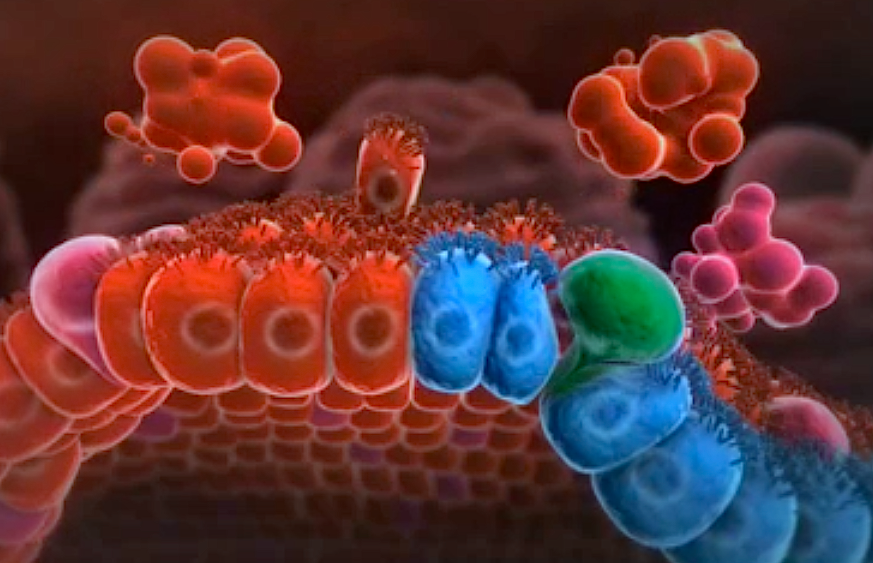Artificial sweeteners are promoted to aid weight loss and prevent diabetes. A new study in the journal Nature reveals that artificial sweeteners can actually lead to the development of glucose intolerance and metabolic disease in a surprising way: by changing the composition and function of the bacteria residing in our intestines.
The findings, the results of experiments in mice and humans by Dr. Eran Elinav of the Weizmann Institute of Science’s Department of Immunology, together with Prof. Eran Segal of the Department of Computer Science and Applied Mathematics, suggests that the widespread use of artificial sweeteners in drinks and food may be contributing to the twin epidemics of obesity and diabetes sweeping much of the world.
For years, researchers have been puzzled by the fact that non-caloric artificial sweeteners do not seem to assist in weight loss, with some studies suggesting that they may even have an opposite effect. The research team discovered that artificial sweeteners, even though they do not contain sugar, nonetheless directly effect how the body utilizes glucose.
Glucose intolerance – the body’s inability to cope with large amounts of sugar in the diet – is the first step on the path to metabolic syndrome and adult-onset diabetes.
When the scientists fed mice water laced with the three most commonly used artificial sweeteners, in amounts equivalent to those permitted by the FDA, the mice developed glucose intolerance, compared to mice that drank water, or even sugar water. Repeating the experiment with different types of mice and different doses of the artificial sweeteners produced the same results – the artificial sweeteners were somehow inducing glucose intolerance.
Next, the researchers investigated a hypothesis that the gut microbiota are involved in this phenomenon. They thought the bacteria might do this by reacting to new substances like artificial sweeteners, which the body itself may not recognize as “food.”
Indeed, artificial sweeteners are not absorbed in the gastrointestinal tract, but they encounter trillions of the bacteria in the gut microbiota while passing through.
The researchers treated mice with antibiotics to eradicate many of their gut bacteria; this resulted in a full reversal of the artificial sweeteners’ effects on glucose metabolism. Next, they transferred the microbiota from mice that consumed artificial sweeteners to “germ-free,” or sterile, mice – resulting in a complete transmission of the glucose intolerance into the recipient mice. This, in itself, was conclusive proof that changes to the gut bacteria are directly responsible for the harmful effects to their host’s metabolism.
The group even found that incubating the microbiota outside the body, together with artificial sweeteners, was sufficient to induce glucose intolerance in the sterile mice. A detailed characterization of the microbiota in these mice revealed profound changes to their bacterial populations, including new microbial functions that are known to infer a propensity to obesity, diabetes, and complications of these problems in both mice and humans.
Repeating their tests with humans they asked a group of volunteers who did not generally eat or drink artificially sweeteners to consume them for a week, and then undergo tests of their glucose levels and gut microbiota compositions.
The findings showed that many – but not all – of the volunteers began to develop glucose intolerance after just one week of artificial sweetener consumption. The composition of their gut microbiota revealed why: the researchers found two different populations of human gut bacteria – one that induced glucose intolerance when exposed to the sweeteners, and one that had no effect either way.
Dr. Elinav believes that certain bacteria in the guts of those who developed glucose intolerance reacted to the chemical sweeteners by secreting substances that then provoked an inflammatory response similar to sugar overdose, promoting changes in the body’s ability to utilize sugar.
According to Dr. Elinav, “Our relationship with our own individual mix of gut bacteria is a huge factor in determining how the food we eat affects us. Especially intriguing is the link between use of artificial sweeteners – through the bacteria in our guts – to a tendency to develop the very disorders they were designed to prevent; this calls for reassessment of today’s massive, unsupervised consumption of these substances.”
Source: Jotham Suez, Tal Korem, David Zeevi, Gili Zilberman-Schapira, Christoph A. Thaiss, Ori Maza, David Israeli, Niv Zmora, Shlomit Gilad, Adina Weinberger, Yael Kuperman, Alon Harmelin, Ilana Kolodkin-Gal, Hagit Shapiro, Zamir Halpern, Eran Segal, Eran Elinav. Artificial sweeteners induce glucose intolerance by altering the gut microbiota. Nature, 2014; DOI: 10.1038/nature13793
Journal Link: http://bit.ly/1qLqGE8












